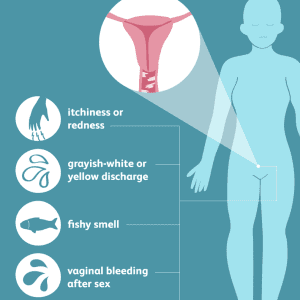Overview
Bacterial vaginosis (BV) is something many women go through, causing discomfort in the vaginal area. It happens when there’s too much of certain bacteria. This usually keeps the vagina healthy, but when the balance is off, BV can occur. It’s more common during reproductive years and for those who are sexually active.
Symptoms
Here are some signs of BV:
- Strange Discharge: Gray, white, or green discharge.
- Fishy Odor: An unusual “fishy” smell.
- Itching: Feeling itchy down there.
- Burning Urination: Discomfort during urination.
Remember, some women might not feel any symptoms, so it’s important to keep an eye on your vaginal health.

When to See a Doctor
Visit a doctor if:
- Unusual Discharge and Discomfort: If things don’t feel right, see your doctor.
- Changes after Treatment: If your usual treatments don’t work.
- New Sexual Partners: Especially if symptoms show up after this.
- Persistent Symptoms: If you suspect a yeast infection but the symptoms stick around after trying to fix it yourself.
Causes
BV happens when the natural balance of bacteria in your vagina gets messed up. Good bacteria usually keep things in order, but if bad bacteria (called anaerobes) grow too much, it leads to BV.
Risk Factors
Certain things make you more likely to get BV:
- Different Sex Partners: Especially if you’ve got new ones.
- Douching: Cleaning your vagina with water or other stuff isn’t needed. It can actually cause BV.
- Lack of Good Bacteria: If your vagina doesn’t have enough good bacteria.
Complications
BV usually doesn’t cause big problems, but sometimes it can lead to:
- Higher STI Risk: You might be more likely to get sexually transmitted infections (STIs).
- Infections after Surgery: If you’ve had gynecological surgery, there’s a slightly higher infection risk.
- Pelvic Inflammatory Disease (PID): BV can sometimes lead to PID, which can affect fertility.
- Pregnancy Issues: While studies aren’t clear, some suggest a link between BV and issues like preterm birth. It’s a good idea to get tested if you’re pregnant and notice BV symptoms.
Prevention
To help avoid BV:
- Skip Scented Products: Don’t use scented soaps or other products. Stick to warm water.
- No Douching: Let your vagina do its own cleaning. Douching can mess up the good bacteria balance.
- Safe Sex: Use condoms or dental dams to lower your risk of STIs. Clean any sex toys properly. Consider limiting sexual partners or avoiding sex.

Comparative Table
| Aspect | Bacterial Vaginosis | Yeast Infection |
|---|---|---|
| Cause | Imbalanced flora | Fungal overgrowth |
| Symptoms | Discolored discharge, fishy odor | Itching, redness |
| Risk Factors | Multiple sex partners, douching | Antibiotic use |
| Complications | STI risk, surgical infections | Recurrent infections |
| Prevention Strategies | Avoid douching, safe sex practices | Probiotics, hygiene |
In a nutshell, understanding bacterial vaginosis is about taking simple steps for your well-being. This guide breaks down the causes, symptoms, and ways to prevent BV in easy language. Keep an eye on your vaginal health, and with a few practical measures, you can maintain a happy and healthy balance. Explore more about other health issues
Conclusion
In conclusion, understanding and managing bacterial vaginosis (BV) is an essential aspect of women’s health. This guide has provided a user-friendly overview of BV, covering its causes, symptoms, risk factors, potential complications, and preventive measures.
BV, while common, can be uncomfortable and disruptive. Recognizing symptoms such as unusual discharge, a fishy odor, itching, or discomfort during urination is crucial. Importantly, not everyone with BV experiences noticeable symptoms, highlighting the importance of regular check-ups and staying vigilant about changes in vaginal health.
When it comes to seeking medical attention, this guide emphasizes the need to consult a healthcare professional if symptoms persist, especially after attempting self-treatment. New sexual partners and changes in sexual activity can also be factors warranting a doctor’s visit.











